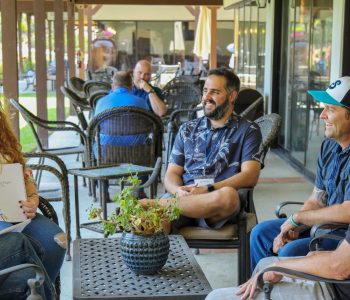 Blog
Blog
Recovering True Community
Professional journals are not on my preferred reading list. Too often the articles on counseling reinforce the notion that the best counseling is the most technically informed. Research studies, complete with baffling statistics and implications for further study, give the false impression that quality relationship has little to do with successful outcome. The effect is to remind churches and mere pastoral counselors that the help they provide is not terribly substantial, that power to heal depends mostly on professional education.
Imagine my surprise when I read the October 1996 issue of American Psychologist that reviewed what 50 years of research in psychotherapy has “proven.” One writer, a prestigious leader in the field, said, “All the research allows us to draw only one firm conclusion: It is a good idea for people with problems to talk to someone they trust.”
When asked about the value of professional training, the writer suggested that graduate education in counseling achieves three things: (1) It increases the likelihood that counselors will be ethical. (2) It helps make them less defensive. (3) It encourages the development of more kindness and empathy in their efforts to help. No mention of technical knowledge. The journal seemed to acknowledge that relational issues have more to do with meaningful help than a mastery of theory or skills.
With the beginning of the idea of psychotherapy in 1895, western culture bought into an assumption that, in some circles, is now being questioned. We assumed that personal, nonmedically caused problems fell into two categories: (1) routine or normal and (2) serious or abnormal. Routine problems, such as temporary bouts with discouragement, could usually be resolved by encouragement from friends, a fun night out, or tackling avoided tasks or responsibilities. Serious problems–those springing from deep-seated emotional roots and labeled psychopathological–were not easily resolved.
The church fell in line with this thinking. Its mandate was reduced to the task of helping normal people cope with life and mature in their spiritual commitment. Serious problems were thought to involve difficulties that required more than what Christianity had to offer. Some within the church have reacted against this conformity to worldly thinking by insisting, correctly but without careful thought, that the Bible has all the answers. They then reduce everyone’s problems to categories the Bible addresses directly. Neither option seems entirely correct. The result is a simplistic understanding of emotional suffering.
Maybe it’s time to consider a distinctly nonmodern idea. Could it be that words like pathology, psychological disorder,and treatment for diagnosed illness, when applied to counseling, have led us away from an important truth? Perhaps people with eating disorders, anxiety problems, and relational difficulties are in fact struggling with “soul trouble” and need what the church has been called to provide–soul care. And maybe the powerful ingredient in soul care is discerning involvement, an encounter with an individual that reflects Christ’s profound acceptance of us, even at our ugliest, and a biblically controlled understanding of what the real issues are.
The advent of managed care is especially problematic for professional counselors. Insurance providers give therapists perhaps five sessions to fix a depression or treat an anxiety disorder. The assumption is that many disorders are treatable by a specific technique, much like a physician eliminates infection with a 2-week dose of antibiotic. Counselors who believe that the quality of relationship they offer heals by penetrating into the lonely, stubborn recesses of a troubled soul are actively prevented from honoring that conviction.
When I began my professional career more than 25 years ago, I chose a slogan to appear on all my business cards and brochures: Meeting Counseling Needs Through the Local Church. The simple idea expressed in that slogan is more culturally critical today than ever before. Christian community is a place where time limits do not apply, where technique is not valued over relationship, and where the character of the helping person is more important than his or her credentials.
For too long the church has been seen as a place where problems are handled by sermons, social times, a few Bible verses, and prayer. Those who don’t respond to this regime are either farmed out to therapists or pressured into pretending that things are better than they are. We think wrongly about what it means to go to church. For most westerners, going to church means attending a worship service and getting involved in one or more programs that meet their needs. The idea of assembling together to consider how to encourage one another to love and good deeds has fallen on hard times.
The church must meet the challenge to recover its mandate to maintain a true gospel community. Christian leaders need to dialogue and answer the question: What does it mean to accept each other the way Christ accepts us, to proclaim our message with the energy of Christ working powerfully in us, to struggle for others with labor pains till Christ is formed in them?
I see an unprecedented opportunity standing within reach of the church–to become healing communities where the gospel, the only real power for good available to the world, is released in all its dynamic splendor to touch lives. Secularists, disenchanted with postmodernism and its empty promise of technology to improve the quality of our lives, are open to words such as spirituality and soul and are leading the way toward valuing the impact of community.
But without the gospel, they cannot realize their dreams. And we Christians, with the gospel, dare not fall short.
The battle for community is fought at two levels: (1) in small groups where a few people seriously pursue a vision for connecting (cf. Ephesians 4:16), and (2) in the larger church structure, where pastoral leaders must decide to place community at the very center of all they do.
Each level has its own challenges. Getting along with people we’re not drawn to and people we really don’t like is one of many challenges at the first level. At the second level, the entire church body will encounter equally tough challenges when it determines to assign the highest priority to developing meaningful community. Many pastors and elders will have to venture into the unfamiliar world of shepherding.
Many Americans are looking to small groups for help in coping with life. They want community, and Christians must recapture the centrality of community in God’s big plan.
I heard Dr. James Houston, professor of spiritual theology at Regent College in Vancouver, make this profound statement: “If the church is to realize its potential, it must recover the doctrine of the Trinity and its implications for human community.” The way the three persons of the Godhead get along is the pattern for true community. And to the degree we relate in similar fashion, the deepest matters of our souls will be powerfully addressed.
I have a vision–simple to state, not so simple to realize–of Christians coming together in communities of shepherds and friends. We must not fall into the trap of “big-event Christianity”–rallies, crusades, and huge church services–where events that do not involve the richest form of community substitute for gatherings that do.
Community-centered Christianity must be recovered, and true community must be defined as something that cannot occur apart from the gospel. We cannot experience the power to see good in a fellow believer even when no good is visible, the power to detach from our own concerns and care more about someone else, or the power to believe every hardship of life is part of a wonderful plan to create Trinitarian-like community without drawing deeply from resources found only in the gospel.
Christian counselors need to see themselves as partners in community, not as providers of opportunity to retreat from it. And we must all ask ourselves: What would happen if we connect deeply to one another and help each other connect more meaningfully to God and to the elements in our lives that we fear?
As we approach the end of the century, the challenge faces the church to envision true community and move toward it. Let us be encouraged to accept the challenge by reflecting on two truths: (1) Jesus died so we could have fellowship with the Father, with the Son, through the Holy Spirit, and with fellow believers. He died so we could enjoy relationship. (2) Problems people experience–those that our culture calls psychological difficulties that require professional treatment–are mainly the product of disconnection, of life outside community. As the church recovers true community, the healing power of the gospel will be seen in ways we cannot imagine.
Originally published in the Enrichment Journal in January 1998.
